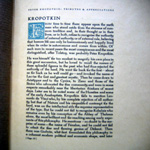Kropotkin
From time to time there appear upon the earth men who stand aside from the streams of common tradition and, in their thought or in their lives, or in both, refuse to recognise the authority of external authority or of external rue, believing that human life can only be harmoniously and happily lives when its order is autonomous and comes from within. Of such men in recent years the most conspicuous and the most distinguished, after Tolstoy, was probably Peter Kropotkin.
He was himself far too modest to magnify his own place in this great succession, but he loved to recall the names of these splendid figures in the past who had thus rejected the authority of the herd. He went far back for the first— about as far back as he well could go— and invoked the name of Lao-tze the first and greatest mystic. Then he came down to Aristippus and to the Cynics, to Zeno and those of the Stoics who advocated the free community and were in some respects remarkably near the libertarian thinkers of recent days. Later are to be noted some of the Hussites and some of the early Anabaptists. Kropotkin fails to mention Leonardo da Vinci who, by his complete rejection of all authority but that of Nature and his unqualified contempt for the herd, was on the intellectual side the supreme representative of the type. But he could not fail to recognize Rabelais who remains even by his conception of the Abbey of Thelema alone, the most brilliant and far-reaching among early exponents of this philosophy. He mentions— no doubt to the surprise of some— the name of Fénelon, and he could not fail to admit the free and flaming genius of Diderot. Then there was Godwin, who first formulated this philosophy in a coherent modern political and economic shape, and later
[Page 19]
|

|